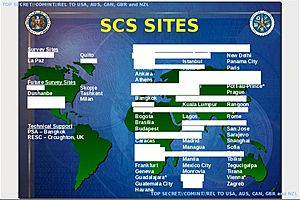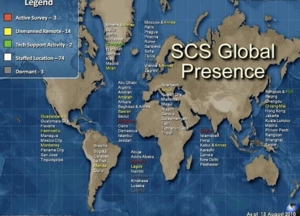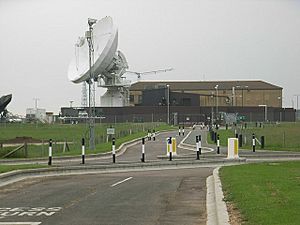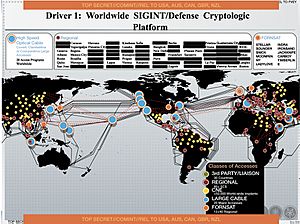Stateroom (surveillance program) facts for kids
STATEROOM is the secret name for a very hidden program that collects information. It involves listening in on international radio, phone calls, and internet messages. This program is run by countries that signed the UKUSA Agreement and are part of the ECHELON network. These countries include Australia, New Zealand, the United Kingdom, Canada, and the United States.
In nearly 100 U.S. embassies and consulates around the world, STATEROOM operations are carried out by the Special Collection Service (SCS). This is a special group run together by the Central Intelligence Agency (CIA) and the National Security Agency (NSA).
Documents shared by Edward Snowden showed that most of the regular staff at these embassies do not know what the STATEROOM team's real job is. Their work is kept very secret.
Contents
What is Project STATEROOM?
Project STATEROOM is a highly secret operation. It focuses on gathering "signals intelligence." This means collecting information from electronic signals. These signals can be from phone calls, radio waves, or internet data. The goal is to learn about what other countries are doing or planning.
The program uses special equipment hidden in diplomatic buildings. These are places like embassies and consulates. They are usually safe places for diplomats to work. But for STATEROOM, they also become secret listening posts.
Who is Involved?
Several countries work together on the STATEROOM project. They are part of a group called the UKUSA Agreement, also known as the "Five Eyes." Each country has its own intelligence agency that takes part.
 – Australian Signals Directorate (ASD)
– Australian Signals Directorate (ASD) – Communications Security Establishment (CSE)
– Communications Security Establishment (CSE) – Government Communications Headquarters (GCHQ)
– Government Communications Headquarters (GCHQ) – Special Collection Service (SCS)
– Special Collection Service (SCS) – Government Communications Security Bureau (GCSB)
– Government Communications Security Bureau (GCSB)
These agencies share the information they collect. This helps them understand global events better.
How Does STATEROOM Work?
The STATEROOM program operates from special locations. These are often inside embassies or consulates. The equipment used is designed to secretly pick up electronic signals. This can include communications from other governments or even private citizens.
The list of places mentioned below is not complete. It only includes information that has been made public.
Australia's Role
Australia's intelligence agency collects signals intelligence. They do this from their embassies and high commissions. These are located in major cities across East Asia and Southeast Asia.
Some of these cities include:
- Bangkok (Thailand)
- Beijing (China)
- Dili (East Timor)
- Hanoi (Vietnam)
- Jakarta (Indonesia)
- Kuala Lumpur (Malaysia)
- Port Moresby (Papua New Guinea)
Canada's Role
In the 1980s, Canada's CSE agency looked for Canadian embassies. They wanted to find places that would be good for setting up surveillance posts. These posts would be used for listening in on communications.
New Zealand's Role
As of March 2015, New Zealand's GCSB agency had a secret listening post. It was called "Caprica." This post was at the New Zealand High Commission in Honiara. Honiara is the capital of the Solomon Islands. The "Caprica" outpost was similar to the NSA's STATEROOM posts. These NSA posts are found in certain United States embassies worldwide.
United Kingdom's Role
By 2013, it was known that British embassies and consulates in certain capital cities had secret surveillance equipment.
One of these cities is:
- Berlin (Germany)
Information collected by Britain is sent to a relay station. This station is at RAF Croughton in Northamptonshire, England. From there, it goes to a data center. This center is run by both the U.S. Central Intelligence Agency and the U.S. National Security Agency. It is located in College Park, Maryland.
United States' Role
In the United States, the Special Collection Service (SCS) helps with STATEROOM. The SCS is a joint effort by the Central Intelligence Agency (CIA) and the National Security Agency (NSA). In November 2013, a Dutch newspaper shared a very secret NSA presentation. This presentation was leaked by Edward Snowden. It showed that the SCS had operations in many U.S. diplomatic buildings.
These operations were in cities like:
- Athens (Greece)
- Bangkok (Thailand)
- Berlin (Germany)
- Brasília (Brazil)
- Budapest (Hungary)
- Frankfurt (Germany)
- Geneva (Switzerland)
- Lagos (Nigeria)
- Milan (Italy)
- New Delhi (India)
- Paris (France)
- Prague (Czech Republic)
- Vienna (Austria)
- Zagreb (Croatia)
In October 2013, reports from former NSA worker Edward Snowden came out. They showed that the SCS had secretly listened to German Chancellor Angela Merkel's private cell phone for over 10 years. They also listened to many other leaders and citizens in Europe and South America.
Other SCS locations include:
- Baku (Azerbaijan)
- Kyiv (Ukraine)
- Madrid (Spain)
- Moscow (Russia)
- Pristina (Serbia)
- Rome (Italy)
- Sarajevo (Bosnia)
- Tbilisi (Georgia)
- Tirana (Albania)
How We Found Out: Edward Snowden
The existence of STATEROOM became known in October 2013. This happened because Edward Snowden, a former NSA contractor, shared secret documents. He started what is known as the global surveillance disclosure.
...These sites are small in size and in number of personnel staffing them. They are covert, and their true mission is not known by the majority of the diplomatic staff at the facility where they are assigned.
This quote from an NSA document explains how secret these operations are. The people working on STATEROOM keep their true purpose hidden from most other embassy staff.
What Countries Said About It
When the STATEROOM program was revealed, many countries reacted. Some were surprised or upset. Others chose not to comment on intelligence matters.
New Zealand's Reaction
Damien Rogers, a former advisor to New Zealand's intelligence agency, the Government Communications Security Bureau (GCSB), was surprised. He said that revealing the "Stateroom" codeword and locations would worry the leaders of the "Five Eyes" intelligence agencies. Nicky Hager, a New Zealand journalist who exposed the ECHELON surveillance system, confirmed that these types of operations have been happening for a long time.
Australia's Reaction
A spokesperson for Australia's Department of Foreign Affairs and Trade said that Australian governments usually do not talk about intelligence matters. Australian Prime Minister Tony Abbott told reporters that all Australian government agencies and officials follow the law.
Canada's Reaction
Representatives from Canada's CSE agency did not comment directly on the leak. A spokesperson for Canada's Defence Minister also chose not to comment.
China's Reaction
Hua Chunying, a spokesperson for China's Foreign Ministry, reacted strongly. She demanded that foreign groups and people in China "strictly obey" international rules. These rules include the Vienna Convention on Diplomatic Relations and the Vienna Convention on Consular Relations.
Germany's Reaction
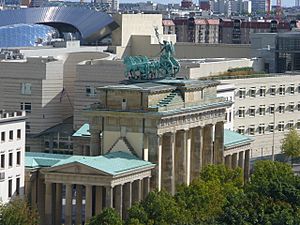
German Foreign Minister Guido Westerwelle called in Britain's Ambassador to Germany, Simon McDonald. He asked for an explanation about Britain's listening center in Berlin.
Indonesia's Reaction
Indonesian Foreign Minister Marty Natalegawa protested the surveillance program. He told the media that such actions are not only a security breach but also a serious violation of diplomatic rules. He said it was not in line with friendly relations between countries.
Malaysia's Reaction
Malaysia's Minister of Home Affairs, Ahmad Zahid Hamidi, said that Snowden's revelations were a "sensitive issue" because they involved several countries.
Solomon Islands' Reaction
The Solomon Islands' Chief of Staff, Robert Iroga, said that New Zealand's actions hurt its image as a "friendly government." He added that communications within the Solomon Islands Government were "highly secret information." He felt this information belonged only to the Solomon Islanders. Iroga also accused New Zealand officials of bullying during trade talks. He claimed New Zealand had shared information about aid money from Taiwan with China.
Thailand's Reaction
Thailand's National Security Council stated that these types of surveillance are considered criminal acts under the Law of Thailand.
Gallery
-
Guide to STATEROOM leaked by Edward Snowden.
-
Glossary of related terms, as defined by the NSA
Learn More
- Global surveillance
- List of government surveillance projects
- Mass surveillance
- Mass surveillance in the United Kingdom
- Mass surveillance in the United States
 | John T. Biggers |
 | Thomas Blackshear |
 | Mark Bradford |
 | Beverly Buchanan |


